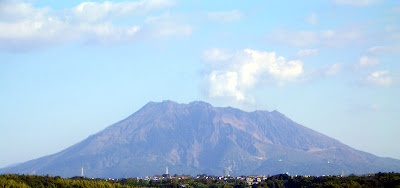
What volcanic and earthquake prone island is this?

The island is a treasure trove of ancient architecture, including this spectacular Buddhist monument built between 750-850 A.D. It is considered to be one of the seven wonders of the world:


In the vicinity of the famous Buddhist monument in the center of this island is the following stunning Hindu monument built in 850. The whole area is dotted with notable Buddhist and Hindu temples:

The island has volcanoes, beaches, the spectacular monuments pictured above, and the following huge capital city:

What exotic island is this?
 What volcanic and earthquake prone island is this?
What volcanic and earthquake prone island is this? The island is a treasure trove of ancient architecture, including this spectacular Buddhist monument built between 750-850 A.D. It is considered to be one of the seven wonders of the world:
The island is a treasure trove of ancient architecture, including this spectacular Buddhist monument built between 750-850 A.D. It is considered to be one of the seven wonders of the world:
 In the vicinity of the famous Buddhist monument in the center of this island is the following stunning Hindu monument built in 850. The whole area is dotted with notable Buddhist and Hindu temples:
In the vicinity of the famous Buddhist monument in the center of this island is the following stunning Hindu monument built in 850. The whole area is dotted with notable Buddhist and Hindu temples: The island has volcanoes, beaches, the spectacular monuments pictured above, and the following huge capital city:
The island has volcanoes, beaches, the spectacular monuments pictured above, and the following huge capital city: What exotic island is this?
What exotic island is this?


 Though the population is only about 500,000, the importance of this city is demonstrated in its key role in history: The heroic St. Francis Xavier landed in this city, the British bombarded it in 1863, and a revolutionary industrialization for an important country was started here.
Though the population is only about 500,000, the importance of this city is demonstrated in its key role in history: The heroic St. Francis Xavier landed in this city, the British bombarded it in 1863, and a revolutionary industrialization for an important country was started here.
 What is the name of this fascinating city?
What is the name of this fascinating city?



 There are many canals in this city and a main river that is used for transportation, including the many water taxis:
There are many canals in this city and a main river that is used for transportation, including the many water taxis:



















